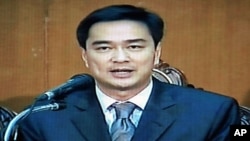Thailand's Prime Minister Abhisit Vejjajiva is facing mounting pressure to end anti-government protests and has declared a state of emergency in the capital Bangkok and nearby provinces. Tensions escalated after anti-government protesters entered the national parliament grounds.
Prime Minister Abhisit Vejjajiva declared the state of emergency in a nationally televised address. He said the country faced "a very serious situation" and he was taking action to restore peace and order.
Mr. Abhisit's 16-month old six party coalition government faced mounting pressure after hundreds of anti-government protesters surrounded and briefly entered the nation's parliament building earlier in the day.
Some members of parliament and staff had to climb walls to escape, while senior leaders were evacuated by helicopter.
Flanked by senior government members, Mr. Abhisit told the TV audience violations of the law had increased and the government would take legal action against the protest leaders.
Government spokesman Panitan Wattanayagorn said "appropriate measures" would be taken, but ruled out excessive force in the implementation of the decree. Panitan said authorities would "do their best" to control the situation.
"The declaration of the emergency decree is based on the situation that is now affecting the lives and the security of the people," he said. "There are several activities that are now affecting the normal life of the general public, including activities affecting the safety of the officers and of the public," the spokesman added.
The emergency law provides authorities with powers to arrest, detain and interrogate suspects, as well as to censor or prohibit publications.
The military is also expected to take a higher profile role in overseeing security. But Panitan said the government had no plans to disperse the demonstrations that have been on-going since mid-March.
The anti-government protests, led by the United Front for Democracy against Dictatorship, want Prime Minister Abhisit to step down and call elections within 15 days. Mr. Abhisit has offered to call elections in nine months.
The protesters, who wear red shirts, largely support former prime minister Thaksin Shinawatra, who was ousted in a coup in 2006 and fled the country in 2008 to avoid a jail sentence for corruption.
The emergency decree also follows unsuccessful efforts Tuesday by hundreds of police and military personnel to force the UDD to vacate a prime commercial area of Bangkok. The rallies at the site began Saturday and forced hundreds of shops and restaurants to close in the popular tourist area.
A representative for Human Rights Watch, Sunai Pasuk, says the location makes it difficult for security forces to move against the protesters.
"It is very difficult if the government is thinking of dispersal of the Red Shirts using the internal security act to vacate the protester[s] from this business community because there will be severe collateral damage to the property, as well as to the life of the protester[s] as well as those who live in the neighborhood," said Pasuk.
Analysts warn the declaration of an emergency decree may trigger further violence by the Red Shirt movement in its bid to force the government to resign.
In the 1970s and in 1992, the Thai military led bloody crackdowns against demonstrators. But the government has repeatedly said it wants to avoid violence this time, although it has issued arrest warrants for 10 UDD leaders.
Related report by VOA's Daniel Schearf




